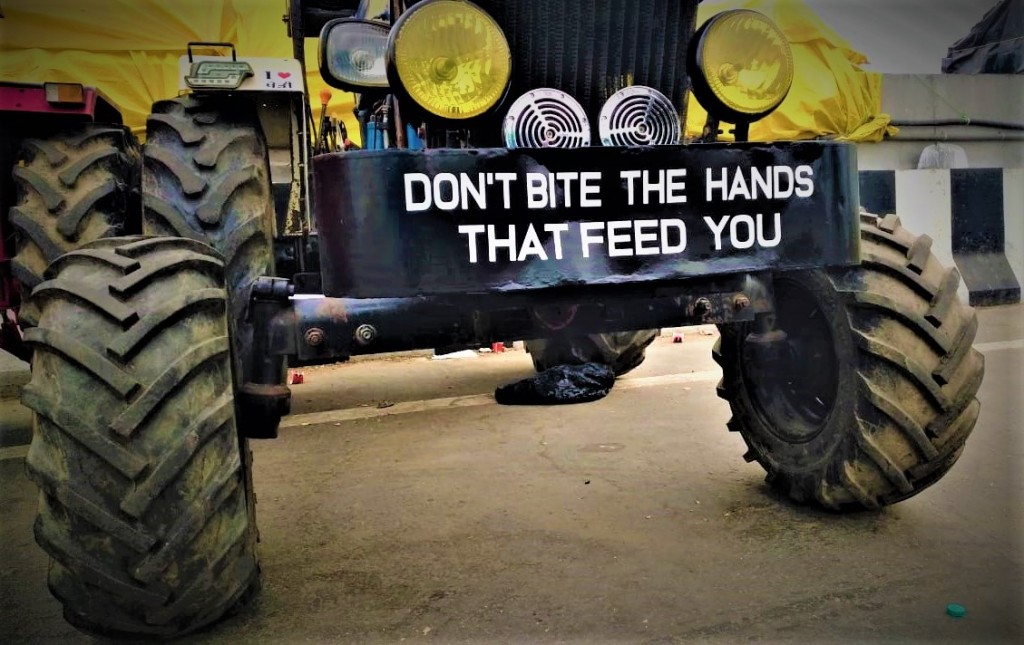
 By Ratna
By Ratna
COLUMN/ THE WRITE LINE
January 29, 2021: Whenever there’s a showdown between the state and its subjects, it’s always interesting to note the messaging that happens in its aftermath.
At the point of time when the showdown dies, a narrative is born.
That narrative is not necessarily belted out directly. It is part decidedly and part unwittingly woven by ‘information clerks’ – also known as the popular press.
Three days into the anti-deregulation farm protesters’ march into Lal Qila (Red Fort), a narrative has begun to take shape.
Without taking sides and without being critical of that narrative, let’s look at the ‘language’ being used to weave the post-showdown messaging.
Let’s look at a list of words and catchphrases that are the building blocks of that newly-born narrative put together by information clerks.
Anarchy.
Rioting.
Traitors, not protesters.
Violence.
Seditious.
Reckless.
Deplorable.
Letdown.
Shocking.
Deadly.
Hooliganism.
Vandalism.
Incited by miscreants.
Breaking the law.
Shame.
On television sets, in newspaper headlines, across the internet and all over social media: this is the broad (or narrow) spectrum of terminology being used to narrate what happened in Delhi on January 26, 2021.
The post-showdown messaging is loud and clear:
The farmers have let a nation of 1.3 billion down by deciding to turn what was to be a peaceful tractor rally into a violent and unlawful storming of a national heritage site, hurting the sentiments of Republic Day-celebrating Indians.
Fair enough.
The point is taken.
The purpose of looking at the narrative is not to disagree with it, but to observe its tone and tenor.
It’s the state that faced the fury of the angry farmers. So, it’s the state’s right to get information clerks under its influence to weave the narrative of its choice.
Questioning that reaction is out of the question.
What is not out of the question is: how have the very same information clerks been reporting on the single biggest crisis that has gripped India’s agricultural landscape since the 1990s? How has the state been narrating India’s spiralling agrarian crisis?
What are the words, jargons, catchphrases deployed in building that messaging?
A total of 2,96,438 farmers committed suicide in India from 1995-2014, according to People’s Archive of Rural India (PARI), a monitor run by writer-activist P Sainath.
A total of 10,281 farmers committed suicide just in 2019, according to the National Crime Records Bureau (NCRB) data on accidental deaths and suicides.
Farmer suicides, due to their sheer numbers, are easily the most critical issue facing India’s largely agrarian population for the past several decades.
The general deregulation of the farm sector through laws, moves and devolving culture has been the biggest contributor to these mass deaths – the second being the vagaries of climate.
So how are information clerks shaping the messaging of this reform-driven onslaught on farmers?
The storming of Lal Qila hasn’t seen any casualties on the side of the state as yet. The act was atrocious nonetheless.
The rage of deregulation causing hundreds of thousands of farmer suicides across the country – well, that too, is atrocious nonetheless. Isn’t it? Or is it not?
Several times more atrocious, several times more violent, several times more deadly, several times more shameful – if the number of deaths is the yardstick of measuring the intensity of the wrongdoing.
But the screaming headlines on telly, social media, websites, newspapers and mags barely use the same words to describe farmer suicides that way.
According to information clerks, circumstances that lead to farmer suicides are not hooliganism, vandalism, violence, betrayal, rioting, and all that listed above.
It’s not seen as a national letdown in the narrative-shaping landscape. Not yet, even after hundreds of thousands of suicides.
But then if these are double standards of narrative-scripting, there would be counterarguments, too. Such as, farmer suicides are happening over a prolonged period of time, deeming it not necessary to be dubbed as acute acts of violence. Or that it’s not comparable to the R-Day storming because it’s happening only on the sidelines of developed society.
Sidelines! True that.
That’s where we have relegated India’s farming sector to in recent decades. The same sector that produces the food we eat to get cracking at more and more ‘development’.
When the keepers of our food system choke over poisonous pesticides or hang themselves in financial frustration – and in huge, huge numbers – that messaging is based on one set of terminology.
When they march towards the centre of the capital city from the sidelines to make themselves heard – causing no loss of life in the process – there’s a totally different set of terminology describing it.
When the dust of the R-Day rumblings settles, the two totally different narratives on the life and times of our farmers will stand out more clearly than ever before.
REPUBLISHING TERMS:
All rights to this content are reserved. If you want to republish this content in any form, in part or in full, please contact us at writetoempirediaries@gmail.com.












